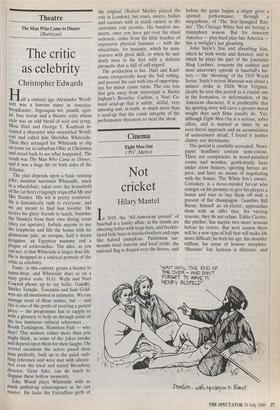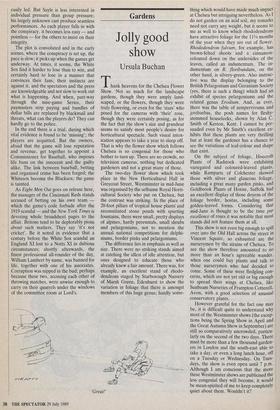Cinema
Not cricket
Hilary Mantel
In 1919, the 'All-American pursuit' of baseball is a family affair; in the stands are cheering ladies with large hats, and freckle- faced little boys in knickerbockers and caps like halved pumpkins. Patriotism sur- mounts local rancour and local pride; the national flag is draped over the fences, and
before the game begins a singer gives a spirited performance, through a megaphone, of 'The Star-Spangled Ban- ner'. The Chicago White Sox are having a triumphant season. But for innocent America — play-hard play-fair America — this is twilight's last gleaming.
John Sayle's fine and absorbing film, which he both wrote and directed, and in which he plays the part of the journalist Ring Lardner, concerns the saddest and most unsavoury episode in baseball's his- tory — the `throwing' of the 1919 World Series. Sayle's recent Mate wan was about a miners' strike in 1920s West Virginia; clearly he sees this period as a crucial one in the formation, or deformation, of the American character. It is predictable that his sporting story will carry a greater moral weight than such films usually do. Yet, although Eight Men Out is a serious, sober effort, and is marred at times by an over-literal approach and an accumulation of unnecessary detail, I found it neither clumsy nor doctrinaire.
The period is carefully recreated. News- paper headlines contain semi-colons. There are conspiracies in wood-panelled rooms and wooden, gentlemanly faces under straw boaters; sporting heroes are poor, and have no means of negotiating with the bosses. The White Sox's owner, Comiskey, is a mean-minded fat-cat who reneges on his promise to give his players a bonus and tries to buy them off with a present of flat champagne. Gambler Bill Burns, himself an ex-player, approaches them with an offer that, for varying reasons, they do not refuse. Eddie Cicotte, the pitcher, has maybe two more seasons before he retires. But next season there will be a new type of ball that will make life more difficult; he feels his age, his shoulder stiffens, his sense of honour atrophies. 'Shoeless' Joe Jackson is illiterate, and easily led. But Sayle is less interested in individual pressure than group pressure; his largely unknown cast produce seamless performances. As each player falls in with the conspiracy, it becomes less easy — and pointless — for the others to insist on their integrity.
The plot is convoluted and in the early scenes, where the conspiracy is set up, the pace is slow; it picks up when the games get underway. At times, it seems, the White Sox find it harder to lose than to win, and certainly hard to lose in a manner that convinces their fans; their instincts are against it, and the spectators and the press are knowledgeable and not slow to work out what is happening. And when, part-way through the nine-game Series, their paymasters stop paying and bundles of dollar bills are replaced by blackmail and threats, what can the players do? They can hardly go to the police.
In the end there is a trial, during which vital evidence is found to be 'missing'; the players are acquitted. But the owners, afraid that the game will lose reputation and revenue, get together to appoint a Commissioner for Baseball, who imposes life bans on the innocent and the guilty alike. The link between baseball, betting and organised crime has been forged; the Whitesox become the Blacksox; the game is tainted.
As Eight Men Out goes on release here, the manager of the Cincinnati Reds stands accused of betting on his own team — which the game's code forbade after the 1919 scandal — and the New York Times is devoting whole broadsheet pages to the affair. Britons tend to be deplorably pious about such matters. They say 'it's not cricket'. Be it noted in evidence that a century before the White Sox scandal an England XI lost to a Notts XI in dubious circumstances; shortly afterwards, the finest professional all-rounder of the day, William Lambert by name, was banned for life, together with one of his associates. Corruption was nipped in the bud; perhaps because these two, accusing each other of throwing matches, were unwise enough to carry on their quarrels under the windows of the committee room at Lord's.



















































 Previous page
Previous page